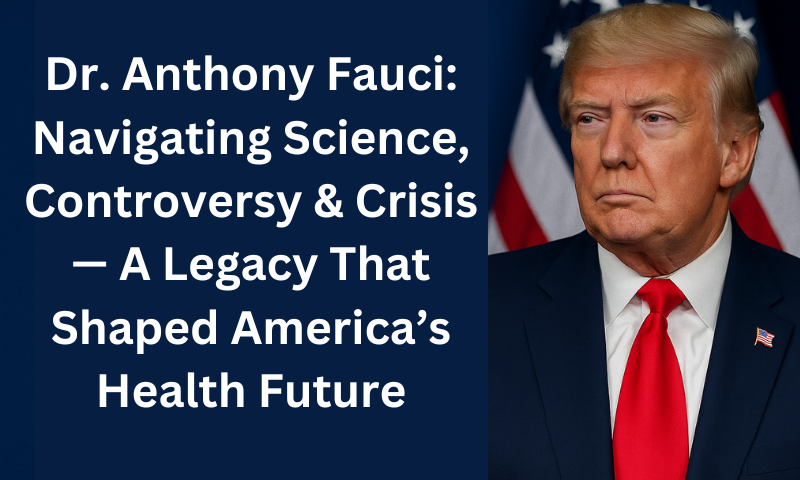Dr. Anthony Fauci: Navigating Science, Controversy & Crisis — A Legacy That Shaped America’s Health Future
Dr. Anthony Fauci: Navigating Science, Controversy & Crisis — A Legacy That Shaped America’s Health Future

Few public individuals in recent years have gained as much notoriety—or as much controversy—as Dr. Anthony Fauci. A compelling example of what it means to be a scientist, a government servant, and a symbol amid a worldwide crisis is Fauci’s transformation from a long-time public health specialist to a household figure during the COVID-19 epidemic.
Despite his retirement from official positions, Fauci’s impact on science policy, public health, and even political discourse is still felt today.
A Career Rooted in Science and Service
1940 saw the birth of Dr. Anthony Stephen Fauci in Brooklyn, New York. He began working at the National Institutes of Health (NIH) in 1968 after receiving training as a physician and immunologist. He advanced through the ranks throughout the ensuing decades, and in 1984 he was appointed Director of the National Institute of Allergy and Infectious Diseases (NIAID).
Dr. Anthony Fauci was a key figure in the U.S. government’s response to infectious disease epidemics such as SARS, MERS, Ebola, and Zika, and his early work was crucial in the development of therapies for HIV/AIDS. He has a lengthy history of dedication, intelligence, and fortitude among scientists and colleagues.
However, nothing could have prepared him or the world for the attention that COVID-19 brought.
The Pandemic and the Public Eye
Following the onset of COVID-19 in early 2020, Dr. Anthony Fauci became a regular presence in American homes, speaking at White House briefings and on media outlets to discuss the science underlying the developing pandemic. He received both praise and criticism for his cool-headed, deliberate communication approach, especially as the U.S. political landscape became more divided.
Conspiracy theories, disinformation efforts, and political attacks were directed at Dr. Anthony Fauci, particularly by those who questioned public health regulations like as mask-wearing, vaccinations, and lockdowns. In spite of this, he stuck to his strategy: “Follow the science,” he said again.
However, detractors pointed to Fauci’s early remarks regarding masks or herd immunity levels to imply that he changed his message too frequently. Nonetheless, proponents emphasised that a key component of the scientific method is that recommendations are changed as new information becomes available.
Retirement and Reflection
Dr. Anthony Fauci formally left his positions as the President’s Chief Medical Advisor and at NIAID in December 2022. He stated at the time that he desired to concentrate on writing, teaching, and mentoring the upcoming generation of scientists rather than retiring from public life.
In a parting statement, he stated, “I want to use what I’ve learnt to help inspire people to pursue careers in science and medicine.” “And perhaps dispel some of the clamour that has accumulated around what it means to perform this type of work.”
Following his resignation, Fauci has continued to give speeches, participate in interviews, and most recently, write a biography called “On Call: A Doctor’s Journey in Public Service.” The book explores his early years, significant events in his career, and thoughts on the COVID-19 era, warts and all.
Controversy Continues
Fauci continues to be the focus of political investigation even after he retires. The origins of COVID-19 have been discussed in congressional hearings, and some senators have questioned NIAID’s previous funding selections for research. In his constant defence of his position, Fauci has emphasised that he has always conducted himself with the utmost honesty as a scientist.
“Making political decisions was not my responsibility. During one session, he stated that the purpose was to provide evidence-based scientific guidance.
Even though these disputes keep making news, they also draw attention to a larger cultural conflict: the conflict between popular opinion and scientific knowledge, between truth and false information.
A Symbol of the Times
Whether you like him or not, Fauci has come to represent a time period. He is seen by many as a symbol of science under siege, struggling to be heard in a sea of noise. Others see him as a symbol of government overreach and a shifting conception of individual liberty in times of crisis.
But despite the media attention and contentious discussions, Dr. Fauci is still a scientist who has devoted more than half of his life to public health, frequently working in the background until history called him to the front.
Concluding remarks
The legacy of Dr. Anthony Fauci is still up for debate. He might be viewed differently by history than by the internet now. He undoubtedly played a key role in some of the most significant public health conflicts of our day, frequently with stakes as high as human life and under intense strain and scrutiny.
Fauci’s name is inscribed in the worldwide narrative of how we survived a once-in-a-century pandemic—and how science, culture, and leadership all clashed in the process—regardless of whether we see him as a hero, a flawed person, or something else entirely.





